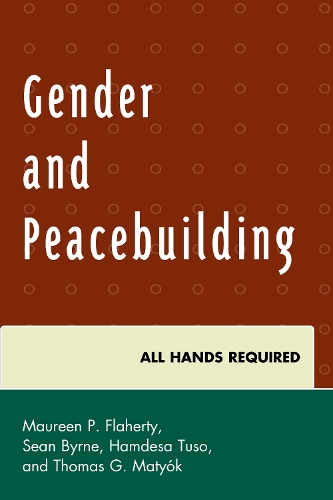
Gender and Peacebuilding: All Hands Required
(Hardback)
Publishing Details
Gender and Peacebuilding: All Hands Required
By (Author) Maureen P. Flaherty
Edited by Thomas G. Matyk
Edited by Sean Byrne
Edited by Hamdesa Tuso
Contributions by Maria Cheung
Contributions by Celia Cook-Huffman
Contributions by Patlee Creary
Contributions by Galia Golan
Contributions by Shirley Graham
Contributions by Nancy Hansen
Bloomsbury Publishing PLC
Lexington Books
16th October 2015
United States
Classifications
Professional and Scholarly
Non Fiction
Feminism and feminist theory
International relations
Peace studies and conflict resolution
303.66
Physical Properties
Hardback
446
Width 158mm, Height 239mm, Spine 37mm
798g
Description
The twenty-first century has brought with it a shift from the notion of human security being located in secure national borders to the need to secure the safety, freedom, and dignity of all. Despite efforts to equalize womens status in the world evidenced by changes in many international projects requiring a gender focus, women and men experience most of the world in very different ways according to gender. Further, the reality is that humans who do not all fall neatly into one of these categories male or female often find their lives further challenged. In the 1980s, Peace and Conflict Studies first began to acknowledge and study the different experiences males and females have during war and peace. Since then, there have been books about women and war, women working at grassroots levels to build peace, women and transitional justice, women and peace education, and womens views of human security. All of these works have contributed to the discourse of our changing world. This book brings together some of those themes and voices and adds more with the final product being more than the sum of its parts. We add to the conversation a book that considers foundational/fundamental issues that span from the interpersonal to the global. Many of the chapters describe empirical research completed with author and community, shared here for the first time. Part One is a collection of case studies, documenting challenges and responses to peacebuilding by women from various parts of the world. Part Two focuses on Peace and Conflict Studies (PACS) as a discipline, examining not only what is, but also what should be taught. This section critiques todays efforts at teaching Peace and Conflict Studies and provides suggestions of how this important work might be shared in more open and equitable ways. Part Three enters territory found even less in the PACS literature. In this section our authors confront patriarchy, engage in a discussion about the contribution queer theory makes to PACS, and tussle with the notion of inclusivity with considerations of both gender and disability. It then ends with a discussion about the contribution feminist methodologies make to PACS.
Reviews
A significant, inspiring and must-read book for all who seek peace in the world, for those who may be tempted to give up hope, and for those who claim that peace is not possible. The authors move beyond simple formulas and platitudes to explore the complex realms of human relationships, and give evidence that every single effort to resolve human conflict peaceably - in our homes, our workplaces, our communities, and in our nations - is significant and important! -- Peggy Chinn, University of Connecticut
Gender and Peacebuilding brings to light often invisible contributions of women peacemakers in a wide diversity of cases across the world. The accounts are lucid, engaging, and theoretically informative. They reveal the complex fabric of culture, conflict, and adversity through which women have persevered to build innovative approaches to peace. The stories in this landmark collection will inspire and shape this field of study. -- Janie Leatherman, Fairfield University
Author Bio
Maureen P. Flaherty is assistant professor in the Peace and Conflict Studies Program at the University of Manitoba. Thomas Matyk is associate professor and chair of the Department of Peace and Conflict Studies at the University of North Carolina at Greensboro. Jessica Senehi is associate professor in the Peace and Conflict Studies Program at the University of Manitoba. Sean Byrne is professor in the Peace and Conflict Studies Program, and director of the Arthur V. Mauro Center for Peace and Justice at St. Pauls College at the University of Manitoba. Hamdesa Tuso is assistant professor in the Peace and Conflict Studies program at the University of Manitoba.
